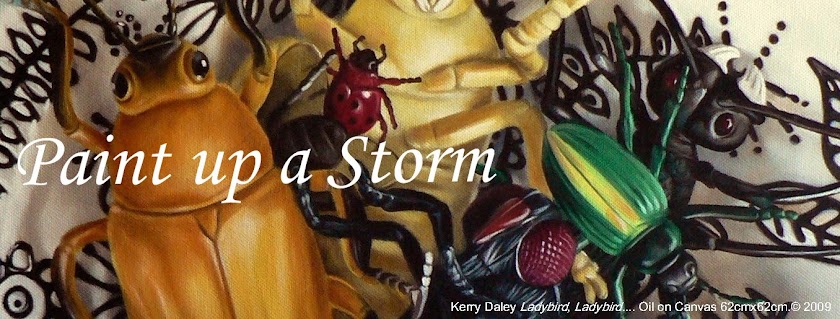When Dawn arrived at my studio, she had recently been retrenched from her job, had few prospects of further work, her husband was retired, and money was tight. Dawn chose her materials and equipment carefully, she bought good quality, and was not extravagant. Perhaps it was her money situation, or her general attitude, but Dawn's brushes were beautifully maintained, and always looked new. This was in sharp contrast to my shocking habits, I had hundreds of brushes, but most were damaged and misshapen beyond rehabilitation.
I am pleased to say that I am reformed. I am not only fastidious with my brushes now, but take good care of all of my art equipment. I still have more brushes than is sensible, and use too many in a painting session, but if I am tempted to leave them without cleaning, I am reminded of Dawn's jars of beautifully kept brushes.
Looking after your brushes should become part of your painting routine. Brushes that are used properly, cleaned properly and stored carefully can last many years. If you find that your brushes could look better, perhaps you should invest in new brushes, or like I did, in better work habits.
Caring for your brushes while you are working
Looking after your brushes starts during the painting session. Good working habits can prolong the life of your paint brushes and make the clean up job easier.
When you are finished painting for the day, all traces of paint must be removed from your brushes, they must be washed, rinsed, dried and packed away, ready for the next painting session. In Caring for Your Brushes - Part 2, I will explain how to do this so that your brushes stay in tip top condition.
I am pleased to say that I am reformed. I am not only fastidious with my brushes now, but take good care of all of my art equipment. I still have more brushes than is sensible, and use too many in a painting session, but if I am tempted to leave them without cleaning, I am reminded of Dawn's jars of beautifully kept brushes.
 |
| Here are some of my brushes - most of them look pretty good! |
Looking after your brushes should become part of your painting routine. Brushes that are used properly, cleaned properly and stored carefully can last many years. If you find that your brushes could look better, perhaps you should invest in new brushes, or like I did, in better work habits.
Caring for your brushes while you are working
Looking after your brushes starts during the painting session. Good working habits can prolong the life of your paint brushes and make the clean up job easier.
- Don't start your painting with a dry brush, dip your brush into water or solvent (turps) before you begin. This will stop the paint from clinging to the bristles and make them easier to clean at the end.
- Rinse your brush thoroughly throughout the painting session, and change your water or turps frequently.
- If you are painting with acrylics, you cannot leave your brushes for any length of time without rinsing them thoroughly. Acrylic paint dries quickly and is difficult to get out once dry.
- Get into the habit of rinsing out your brush and lying it down on the work surface during your working session rather than leaving it upright in the water jar. A brush cannot stand on its head without suffering damage to the bristles. When bristles are bent, it is almost impossible to correct them.
- If you need to move away from your painting for a few hours, wrap your brushes in a bit of rag soaked in turps and then in clingfilm or a plastic bag. They can be stored like this in a sealed container or in the fridge if the weather is hot. (this applies to oil painting only, watercolour and acrylic brushes must be properly rinsed out.)
- Don't use good brushes to apply masking fluid, it will ruin the brush! If you use masking fluid regularly, keep brushes aside just for that purpose. Dip the brush into dish washing liquid first, remove the excess, and then into the masking fluid. When you are finished, the masking fluid should rinse out quite easily.
- Keep your watercolour and oil painting brushes separate if you paint with both. Don't use the same brushes for both mediums.
When you are finished painting for the day, all traces of paint must be removed from your brushes, they must be washed, rinsed, dried and packed away, ready for the next painting session. In Caring for Your Brushes - Part 2, I will explain how to do this so that your brushes stay in tip top condition.


No comments:
Post a Comment